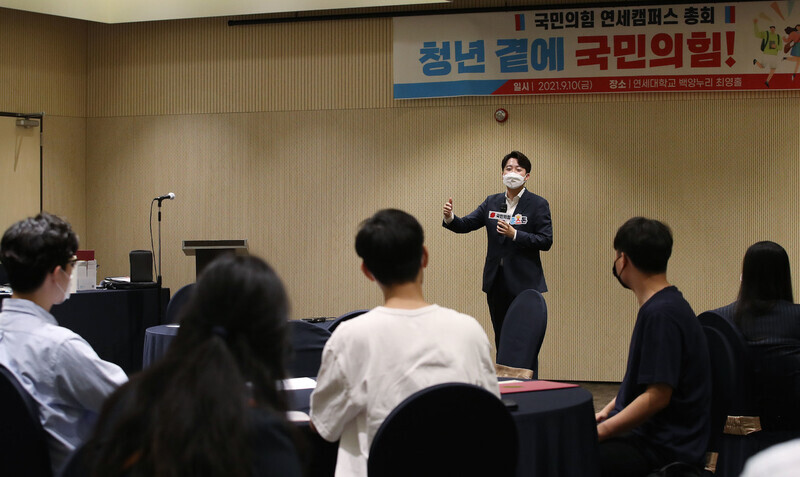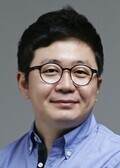hankyoreh
Links to other country sites 다른 나라 사이트 링크
[Column] The politics of S. Korea’s “activated twentysomething men”


The South Korean presidential race is experiencing whirlwind after whirlwind with every shift in public opinion among voters in their 20s. Especially noteworthy is how, in the case of People Power Party presidential nominee Yoon Suk-yeol, poll numbers seesaw according to the attitude of twentysomething male voters. Leading candidates and parties have prostrated themselves, professing they would listen to the voices of younger generations. But instead of listening to young voters as a whole — which would include women — they have only paid attention to a subset of men who avow “anti-feminism.” These are the kind of men in their 20s who actively speak and act on gender issues who I call “activated twentysomething men” to distinguish them from other young adult groups.
The existence of activated twentysomething men is anything but new. Even in the past, there were twentysomething male groups that took up anti-feminism and exhibited extreme mindsets and behaviors. For example, the nationwide cyberbullying incident in which twentysomething men harassed a feminist media outlet run by university students — known as the “Woljang incident” — came to pass two decades ago.
Although the incident occurred in 2001, how events unfolded then is uncannily similar to what’s transpiring now in 2022. Back then, the Ministry of Gender Equality had just been established, and men were already calling for its abolishment. The activated twentysomething men of those days are now in their 40s. Surprisingly, they are considered one of the most politically progressive generations in South Korean politics. This shows that activated twentysomething men can emerge from both progressivism and conservatism.
Another important thing to note is that the mindset commonly found in activated twentysomething men is starkly different from that found in the average young man. Men in their 20s are much less homogeneous than other generations, as has been shown again and again in polls and statistical studies (see SisaIN’s 2019 special on men in their 20s and KBS’ 2021 “Focused Investigation on Generational Perceptions”).
Different generations demonstrate different levels of homogeneity. In other words, how similar twentysomethings are to each other may differ from how similar sixtysomethings are to each other. An example of a highly homogeneous group is the “conscription generation” who went to war and shed blood together. Because they share the terrible trauma of facing life-and-death situations, members of the conscription generation are more likely to band together when facing political choices.
South Korean twentysomething men of today are much more divided than other generations. Division based on income and social class is especially significant. As isolated individuals, some of them are filling the void in their identity with a common enemy — feminism. This intense hostility is one of the only things sustaining homogeneity within this particular generation. But why are twentysomething men much more heterogeneous than other generational groups? Experts are conflicted on the answer — something South Korean society should make an effort to understand moving forward.
In times past, politicians frequently used the phrase “national integration” even when they didn’t actually mean it. They said that, whether poor or rich, male or female, the Korean people had to come together as citizens of the same country. But now, even presidential nominees and party chiefs are hellbent on sowing enmity amongst the citizenry by getting aboard the misogynist bandwagon.
Would this be because politicians are inherently evil? Rather, a better explanation may be found in polling methods and statistical findings that show the short-term effects of a divide-and-conquer strategy. A politics of division is the inevitable outcome in a political scene governed by a “merchant’s sense of reality” which permits anything for the sake of profit and pragmatism.
Though it would be inaccurate to say that the public opinion of twentysomething men equals that of twentysomething voters, it wouldn’t be wise to discount twentysomething men as an overrepresented, illusionary group.
More so than groups with a lower political participation rate, groups with a higher political participation rate experience greater political efficacy, exercise more influence, and thereby change real politics in tangible ways. It’s natural that the viewpoints of citizens who more actively participate in politics are better reflected in politics.
However, there are many citizens for whom political participation is inaccessible — due to economic hardship, physical and environmental disabilities, or other reasons. The disregard or underestimation of their demands is anything but desirable. If the demands of a group with a high political participation rate end up overshadowing the demands of citizens who cannot actively participate in politics, democratic values and cultures will crumble from their very foundation.
Activated twentysomething men existed in the past. But their existence has never led to the proliferation of hate and the destruction of democracy like now. More detrimental to democracy, however, are establishment politicians who are exploiting these men for political gain.
Please direct questions or comments to [english@hani.co.kr]

Editorial・opinion
![[Column] Has Korea, too, crossed the Rubicon on China? [Column] Has Korea, too, crossed the Rubicon on China?](https://flexible.img.hani.co.kr/flexible/normal/500/300/imgdb/original/2024/0419/9317135153409185.jpg) [Column] Has Korea, too, crossed the Rubicon on China?
[Column] Has Korea, too, crossed the Rubicon on China?![[Correspondent’s column] In Japan’s alliance with US, echoes of its past alliances with UK [Correspondent’s column] In Japan’s alliance with US, echoes of its past alliances with UK](https://flexible.img.hani.co.kr/flexible/normal/500/300/imgdb/original/2024/0419/2317135166563519.jpg) [Correspondent’s column] In Japan’s alliance with US, echoes of its past alliances with UK
[Correspondent’s column] In Japan’s alliance with US, echoes of its past alliances with UK- [Editorial] Does Yoon think the Korean public is wrong?
- [Editorial] As it bolsters its alliance with US, Japan must be accountable for past
- [Guest essay] Amending the Constitution is Yoon’s key to leaving office in public’s good graces
- [Editorial] 10 years on, lessons of Sewol tragedy must never be forgotten
- [Column] A death blow to Korea’s prosecutor politics
- [Correspondent’s column] The US and the end of Japanese pacifism
- [Guest essay] How Korea turned its trainee doctors into monsters
- [Guest essay] As someone who helped forge Seoul-Moscow ties, their status today troubles me
Most viewed articles
- 1[Column] The clock is ticking for Korea’s first lady
- 2Hong Se-hwa, voice for tolerance whose memoir of exile touched a chord, dies at 76
- 3After 2 months of delayed, denied medical care, Koreans worry worst may be yet to come
- 4[Column] Has Korea, too, crossed the Rubicon on China?
- 5US overtakes China as Korea’s top export market, prompting trade sanction jitters
- 6Samsung barricades office as unionized workers strike for better conditions
- 7[Correspondent’s column] In Japan’s alliance with US, echoes of its past alliances with UK
- 8All eyes on Xiaomi after it pulls off EV that Apple couldn’t
- 9[Correspondent’s column] The US and the end of Japanese pacifism
- 10[Guest essay] How Korea turned its trainee doctors into monsters